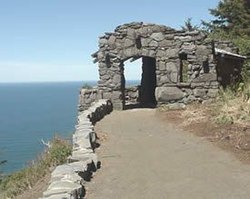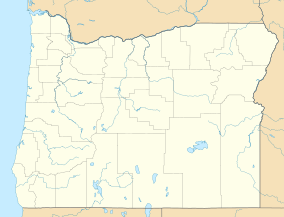Cape Perpetua
| Cape Perpetua | |
|---|---|

Cape Perpetua Whispering Spruce view
|
|
| Location | Lincoln County, Oregon, USA |
| Nearest city | Yachats, Oregon |
| Coordinates | 44°17′14″N 124°06′50″W / 44.2872°N 124.114°WCoordinates: 44°17′14″N 124°06′50″W / 44.2872°N 124.114°W |
| Governing body | United States Forest Service |
|
Cape Perpetua Shelter and Parapet
|
|

West Shelter observation point
|
|
| Nearest city | Yachats, Oregon |
|---|---|
| Built | 1933 |
| Architect | Civilian Conservation Corps; United States Forest Service |
| Architectural style | Other |
| NRHP Reference # | |
| Added to NRHP | March 17, 1989 |
Cape Perpetua is a large forested headland projecting into the Pacific Ocean on the central Oregon Coast in Lincoln County, Oregon. The land is managed by the United States Forest Service as part of the Siuslaw National Forest.
Cape Perpetua is located about 2 miles (3.2 km) south of Yachats, Oregon, along U.S. Route 101. It is a typical Pacific Northwest headland, forming a high steep bluff above the ocean. At its highest point, Cape Perpetua rises to over 800 feet (240 m) above sea level. From its crest, an observer can see 70 miles (110 km) of Oregon coastline and as far as 37 miles (60 km) out to sea on a clear day.
For at least 6,000 years, Native Americans hunted for mussels, crabs, sea urchins, and clams along the coast near Cape Perpetua. Cape Perpetua was part of the southern territory of the Alsea people. In their language the Cape was named Halqaik, which might mean something like 'exposed place'. Evidence of their lives can still be found in the huge piles of discarded mussel shells that lays among the shore near the Cape Perpetua Visitor Center.
The cape was named by Captain James Cook on March 7, 1778, as he searched for the Pacific entrance to a Northwest Passage. Cook named the cape Perpetua because it was discovered on St. Perpetua's Day.
The area became part of the Siuslaw National Forest in 1908. In 1914, the United States Forest Service cut a narrow road into the cliff around Cape Perpetua and constructed a wooden bridge across the Yachats River, opening travel between the small community of Yachats and Florence to the south. The wooden bridge was replaced in 1926 with a steel structure. The Cape Perpetua section of the Roosevelt Memorial Highway (now Highway 101) was built in the 1930s.
...
Wikipedia



